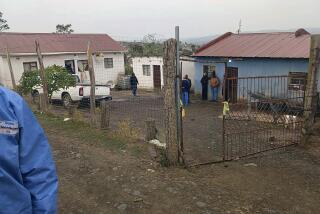South Africa Says It Killed Top Terrorist
- Share via
JOHANNESBURG, South Africa — Two suspected African National Congress insurgents, including a man described as South Africa’s “most wanted terrorist,” were killed in a gun battle with police outside Johannesburg, the government’s Bureau for Information reported Sunday.
Zondi Roland Molapa, who was wanted for three midday bombings in downtown Johannesburg that injured more than 30 people, was shot to death Saturday outside Katlehong, a black township only 15 miles southeast of Johannesburg where ANC insurgents three weeks ago killed five local policemen and wounded 12 others in two daring attacks.
Molapa had planned or carried out at least 17 major guerrilla operations, police sources said, and over the last year the congress’ Katlehong group has been one of its most effective, carrying out dozens of operations--and making it a primary target for police counterinsurgency efforts.
Molapa and a woman, also described as a “much-sought-after ANC terrorist” but not identified, were reportedly spotted by a police patrol in a parked car on a road leading into Katlehong. Heavily armed, the two were apparently preparing for another ambush of the security forces, a government spokesman speculated.
Woman Dressed as Man
A fierce gun battle followed when the policemen returned with reinforcements, according to the Information Bureau, and Molapa and the woman, who was dressed in men’s clothing, were both killed as they fired long bursts from their Soviet-made AK-47 assault rifles at the approaching security forces. No policemen were injured, the bureau said.
This brought to 19 the number of suspected African National Congress insurgents reported killed in the six weeks since the government imposed a national state of emergency. Information from unofficial sources puts the total at nearly 30 as a result of a sharp increase in ANC attacks recently around Johannesburg, Pretoria, Durban and the eastern Cape industrial centers of Port Elizabeth and East London.
Katlehong residents said Sunday that a third and possibly a fourth guerrilla had escaped and eluded pursuing police in a lengthy chase with wild gunfire through the township and adjoining fields, but government spokesmen said they had no information on this.
Police said they recovered three AK-47 rifles from Molapa’s car as well as a rocket launcher, hand grenades, ammunition and explosives, all apparently supplied by the Soviet Union.
The African National Congress is the principal guerrilla group fighting South Africa’s apartheid system of minority white rule and racial separation.
3 Burned to Death
Three black men were burned to death in Soweto, the black satellite city outside Johannesburg, according to the Information Bureau, the only authorized source of news on the civil unrest here. Two men were arrested in connection with one of the deaths, a spokesman said. No further information was available on the incidents.
“These people are killing one another right and left,” the spokesman said, “and we do not always know when or how or why.”
In the long-troubled eastern Cape province town of Cradock, a police foot patrol was attacked with firebombs, which are made from gasoline-filled bottles with lighted cloth wicks, according to the Information Bureau, and in return fired at its assailants with shotguns, wounding two people. No other major incidents of unrest were reported.
British Foreign Secretary Geoffrey Howe, nearing the end of his weeklong mission to promote dialogue between South Africa’s white-led minority government and the country’s black majority, on Sunday continued his discussions with civil rights lawyers, business leaders, other liberal white activists--and Prof. J.P. de Lange, the head of the Broederbond, the secret Afrikaner political organization that many believe controls both the National Party and the government.
Puts Onus on Pretoria
Amid the increasingly pessimistic assessments of the Howe mission, a senior British official sought to place the onus for its failure on Pretoria. “It is clear to Sir Geoffrey now that if the logjam is to be broken, key steps have got to come from the South African government,” the official told newsmen at a background briefing. “In Sir Geoffrey’s view, it is not his mission that is in trouble--it is South African society that needs salvaging.”
More to Read
Sign up for Essential California
The most important California stories and recommendations in your inbox every morning.
You may occasionally receive promotional content from the Los Angeles Times.













